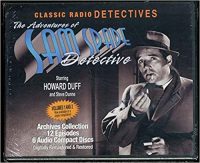
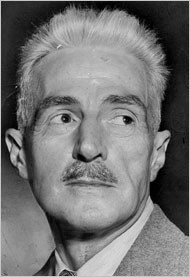 The Adventures of Sam Spade (1946-1951) aired “The Betrayal in Bumpus Hell” on January 16, 1949 as its 122nd episode of approximately 243, only 74 of which are still in circulation (this includes 12 AFRS repeats and 2 rehearsal shows). We have previously aired but four episodes of this show, the first in 2014, then July of 2018, August of 2019, and the most recent in May of 2021. For newcomers, and as a refresher for long time listeners, we reprise the historical notes about the origins of Sam Spade as preface to that initial episode.
The Adventures of Sam Spade (1946-1951) aired “The Betrayal in Bumpus Hell” on January 16, 1949 as its 122nd episode of approximately 243, only 74 of which are still in circulation (this includes 12 AFRS repeats and 2 rehearsal shows). We have previously aired but four episodes of this show, the first in 2014, then July of 2018, August of 2019, and the most recent in May of 2021. For newcomers, and as a refresher for long time listeners, we reprise the historical notes about the origins of Sam Spade as preface to that initial episode.
Sam Spade was the private detective and creation of Dashiell Hammett (1894-1961, photo top right). Based on Hammett’s time as a Pinkerton detective from people he knew or had heard about, Spade first appeared in the third of Hammett’s five novels, The Maltese Falcon, in 1930. Only three other stories, all short works, would feature Spade in magazines and all appeared in 1932. One final Spade story was published in 2013, over 50 years after his death in 1961. The Maltese Falcon was brought to film three times: 1931, 1936, and the now film noir classic of 1941 (film still below left) starring Humphrey Bogart, Peter Lorre, Mary Astor, and Sydney Greenstreet.
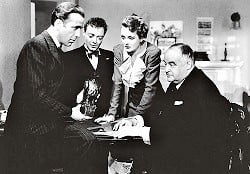
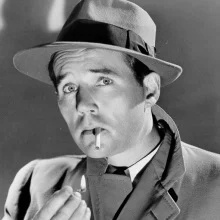 For all but its final radio season Howard Duff (1913-1990, photo at right) would star as Sam Spade. Duff would go on in later years to play various roles in quite a few films, and later with the advent of television would enjoy a lengthy career in many shows as star or character actor (drama and detective primarily) and was an easily recognizable presence on both the silver and small screens. Like Spade’s creator, in the late 1940s (pre-HUAC, but Hammett failing to answer a Congressional Committee’s questions under oath stemming from his overt communist dealings), but years later and owing to a different set of circumstances, Duff found himself in the crosshairs of the early 1950s McCarthy-era House Unamerican Activities Committee (HUAC) and was labeled a communist subversive. It was at this point that this soft “blackballing” dovetailed with his burgeoning tv and film career that made it advantageous for him to leave the radio series, at which point Stephen Dunne would take over as the voice of Sam Spade for the series’s final 1950-51 season. According to the writeup by Radio Spirits on their 2014 calendar, on which Duff has the November slot: “A lot of talent came out of the Armed Forces Radio Service at the conclusion of the Second World War. One of the most outstanding examples was an energetic young sergeant named Howard Duff, born on November 24, 1913. A staff announcer for many AFRS features during the war, he was ready for the big time as soon as he doffed the uniform. It didn’t take long for him to land the role of a lifetime, bringing Dashiell Hammett’s legendary private eye Sam Spade to the microphone. In his four years in the role, Duff did the impossible–-he replaced Humphrey Bogart’s film version as the definitive embodiment of the Hammett character: tough, yet vulnerable; hardboiled, yet with a sense of humor about his weekly predicaments. Among the legions of postwar radio detectives, Duff’s Spade stood out as one of the few truly originals.”
For all but its final radio season Howard Duff (1913-1990, photo at right) would star as Sam Spade. Duff would go on in later years to play various roles in quite a few films, and later with the advent of television would enjoy a lengthy career in many shows as star or character actor (drama and detective primarily) and was an easily recognizable presence on both the silver and small screens. Like Spade’s creator, in the late 1940s (pre-HUAC, but Hammett failing to answer a Congressional Committee’s questions under oath stemming from his overt communist dealings), but years later and owing to a different set of circumstances, Duff found himself in the crosshairs of the early 1950s McCarthy-era House Unamerican Activities Committee (HUAC) and was labeled a communist subversive. It was at this point that this soft “blackballing” dovetailed with his burgeoning tv and film career that made it advantageous for him to leave the radio series, at which point Stephen Dunne would take over as the voice of Sam Spade for the series’s final 1950-51 season. According to the writeup by Radio Spirits on their 2014 calendar, on which Duff has the November slot: “A lot of talent came out of the Armed Forces Radio Service at the conclusion of the Second World War. One of the most outstanding examples was an energetic young sergeant named Howard Duff, born on November 24, 1913. A staff announcer for many AFRS features during the war, he was ready for the big time as soon as he doffed the uniform. It didn’t take long for him to land the role of a lifetime, bringing Dashiell Hammett’s legendary private eye Sam Spade to the microphone. In his four years in the role, Duff did the impossible–-he replaced Humphrey Bogart’s film version as the definitive embodiment of the Hammett character: tough, yet vulnerable; hardboiled, yet with a sense of humor about his weekly predicaments. Among the legions of postwar radio detectives, Duff’s Spade stood out as one of the few truly originals.”
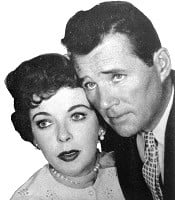 Duff would marry one of the most respected and groundbreaking women actors and directors in film history in 1951, Ida Lupino (1918-1995, Lupino & Duff photo at right). The two would star together in several films throughout the 1950s. As to Duff’s film and television appearances, they are too numerous to mention all of them here, though a sampling may recall him to many a fan of the films and TV shows in which he appeared: Films–The Naked City (1948), While the City Sleeps (1956, with Ida Lupino), and Kramer vs. Kramer (1979); Television–The Rockford Files, The Golden Girls, Knots Landing, Dallas, as “Capt.” Thomas Magnum, II–-grandfather of Thomas Magnum starring Tom Selleck on Magnum, P.I. His genre credits include an episode of The Twilight Zone, and Batman (“The Entrancing Dr. Cassandra” with Ida Lupino).
Duff would marry one of the most respected and groundbreaking women actors and directors in film history in 1951, Ida Lupino (1918-1995, Lupino & Duff photo at right). The two would star together in several films throughout the 1950s. As to Duff’s film and television appearances, they are too numerous to mention all of them here, though a sampling may recall him to many a fan of the films and TV shows in which he appeared: Films–The Naked City (1948), While the City Sleeps (1956, with Ida Lupino), and Kramer vs. Kramer (1979); Television–The Rockford Files, The Golden Girls, Knots Landing, Dallas, as “Capt.” Thomas Magnum, II–-grandfather of Thomas Magnum starring Tom Selleck on Magnum, P.I. His genre credits include an episode of The Twilight Zone, and Batman (“The Entrancing Dr. Cassandra” with Ida Lupino).
“The Betrayal in Bumpus Hell” actually tells two alternating stories; one is the primary story, while the other is a western story Sam reads in a magazine whenever he gets the chance during brief respites in the main story. While the primary yarn involves a cheating husband, an angry wife, eventual blackmail and of course a murder, this familiar but serious melodrama is effectively offset by the lighthearted happenings in the western tale as Sam reads short scenes out loud. Both interwoven stories actually work to give the listener an interesting half hour of radio entertainment, a welcome plus being the usual sprinkling of Sam’s semi-serious attitude regular listeners had come to expect from their favorite detective.
Play Time: 24:33
{“The Betrayal in Bumpus Hell” aired on a Sunday evening in the middle of January 1949. Notwithstanding the cold and dreary weather and the fact that there were no school holidays in sight, the neighborhood gang was undaunted, knowing the only way they could see to lift their spirits was a trip to the corner newsstand the next day after school. Astounding SF (1930-present, now Analog) was still a must buy (especially so with the cover story being as by Lewis Padgett, a pseudonym used by the popular and critically acclaimed husband and wife writing team of Henry Kuttner and C. L. Moore), even though with Sam Spade still in their thoughts from the night before they were hoping to spot a mystery or detective pulp to continue the excitement a good detective story offered. Astounding was a monthly in 1949. Black Mask (1920-1951) was the king of the hill when it came to supplying everything the detective reader could want, and had held that position for some time. It didn’t hurt the magazine’s street cred or popularity when it serialized Dashiell Hammett’s novel The Maltese Falcon, the first installment appearing in the September 1929 issue. Black Mask was a bi-monthly in 1949. The Phantom Detective (1933-1953) drew readers who enjoyed solid crime and/or detective fiction as well as those who went for a little masked superhero in their Good Guys vs. Bad Guys crime stories (ala The Shadow). It managed only 5 issues in 1949 as it transitioned from a bi-monthly schedule in 1948 to its new quarterly schedule in 1950.}
[Left: Astounding, Jan. 1949 – Center: Black Mask, Jan. 1949 – Right: Phantom Detective, Jan. 1949]
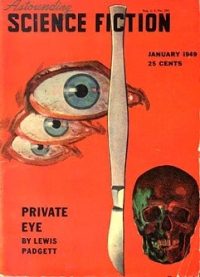
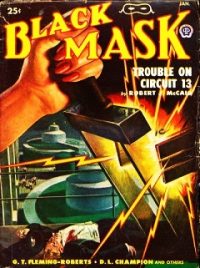
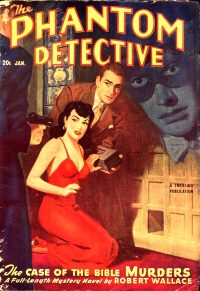
To view the entire list of Old Time Radio episodes go here.